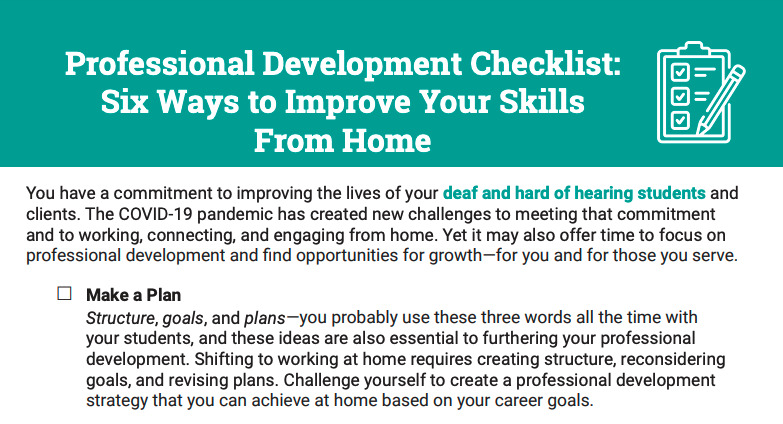For regularly updated information and resources in response to COVID-19, visit:
nationaldeafcenter.org/covid19
[Download PDF]
You have a commitment to improving the lives of your deaf and hard of hearing students and clients. Now it has been affected by the COVID-19 pandemic, creating new challenges to work, connect, and engage from home. Yet it may also offer time to focus on professional development and find opportunities for growth — for you and for those you serve.
This six-point checklist from the National Deaf Center on Postsecondary Outcomes can help you grow professionally and improve your work with deaf students and clients. It is designed for disability service providers, vocational rehabilitation counselors, student support specialists, academic advisors, and anyone who regularly works to ensure greater deaf success in education and employment.
Make a Plan
Structure, goals, and plans. They are three words you probably use all the time with your students, and they are also essential for furthering your professional development. Shifting to working at home requires creating structure, reconsidering goals, and revising plans. Challenge yourself to create a professional development strategy that you can achieve at home based on your career goals.
Take Free Online Classes
Students are now learning online. Why not you, too? Expand your expertise and even earn continuing education units or clock hours (CEU/CRCs) for free. The National Deaf Center offers online courses on a variety of topics — including a new class, Developing Accessible Work Based Learning Programs, which provides practical knowledge and resources for professionals seeking to increase employment opportunities for deaf youth.
Embrace New Technology
Video meeting platforms, online project management tools, online library resources, and human resource systems all come with layers of functionality designed to make your work-from-home life more effective and efficient. Now is the time to learn how to use that technology, with a special focus on the features needed to connect with your deaf students and clients online.
Improve Communication
Deaf people widely vary in their communication preferences, needs, and language skills. Take Deaf 101, a short online course that explains the diversity within the deaf community and how to communicate effectively in professional and educational settings. Explore and download toolkits with customized resources on providing vocational rehabilitation and disability services to deaf people. If you are learning American Sign Language (ASL), make a plan to improve your skills. Enroll in an online class, download an ASL app, and practice your signing with colleagues during video meetings.
Get Social
Not on Twitter or LinkedIn yet? Both are ideal for connecting with peers and thought leaders in your field, following organizations you belong to, learning new developments and research, and building a profile for networking online and at conferences. Review social media best practices, establish accounts, and engage!
Connect with Colleagues
You are not alone. Your colleagues across the country are also experiencing disruption and isolation. Reach out to them, set up video chats, and share ideas for staying engaged and developing professionally.





